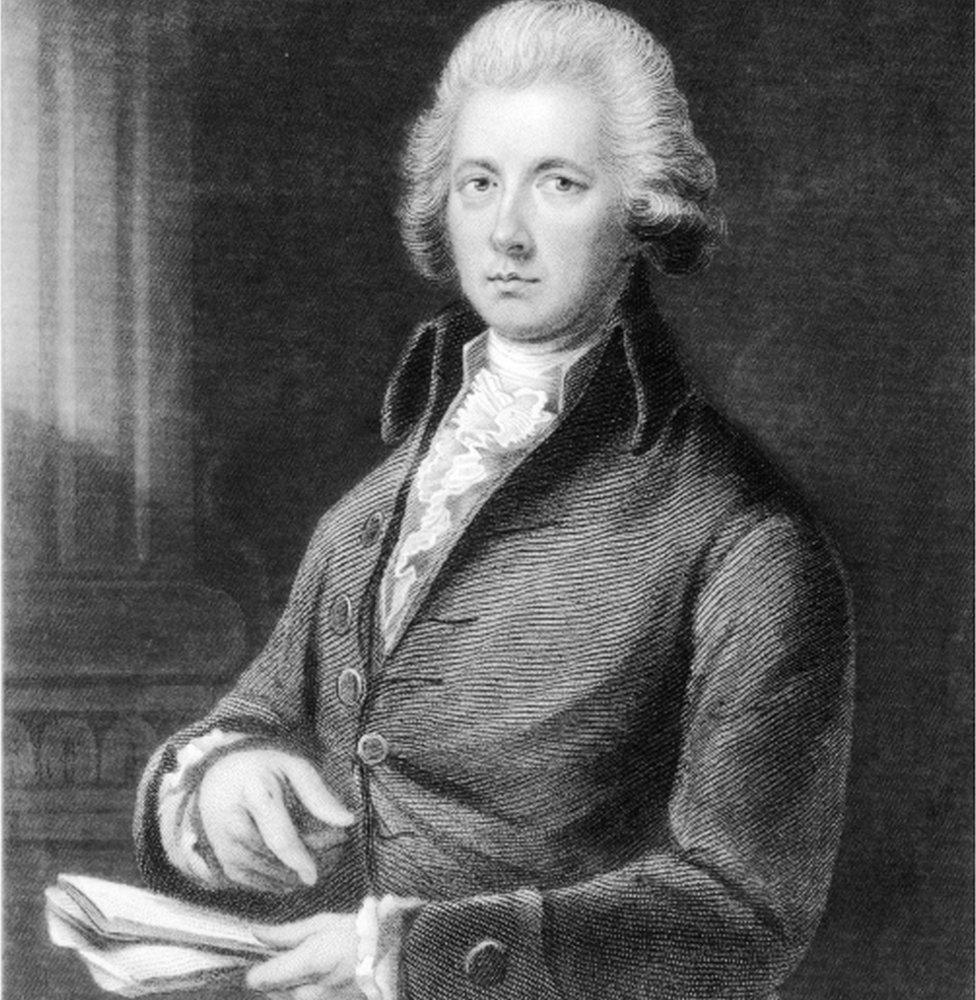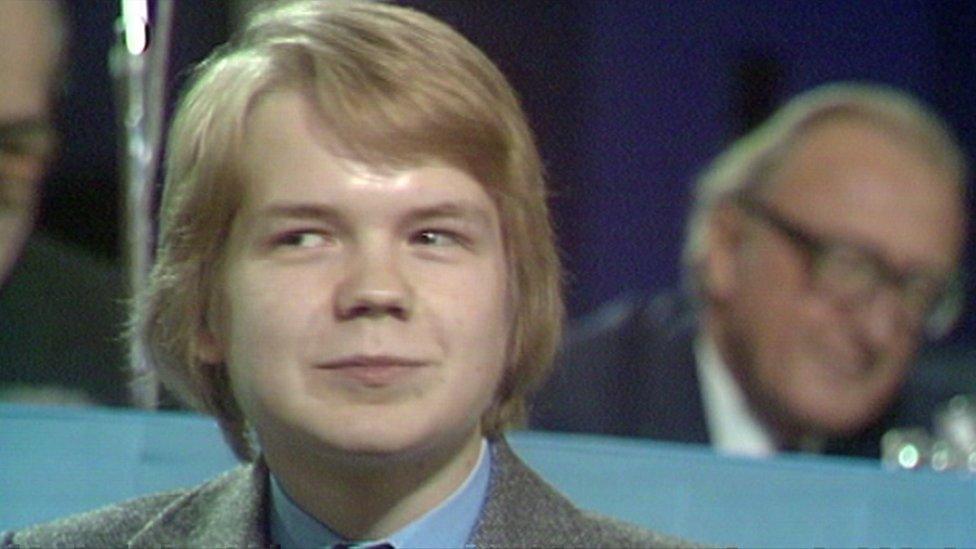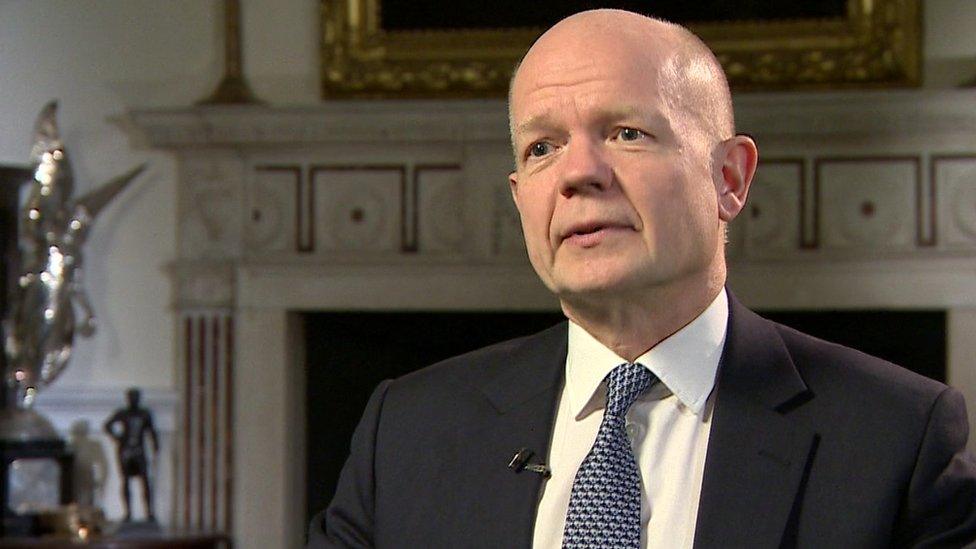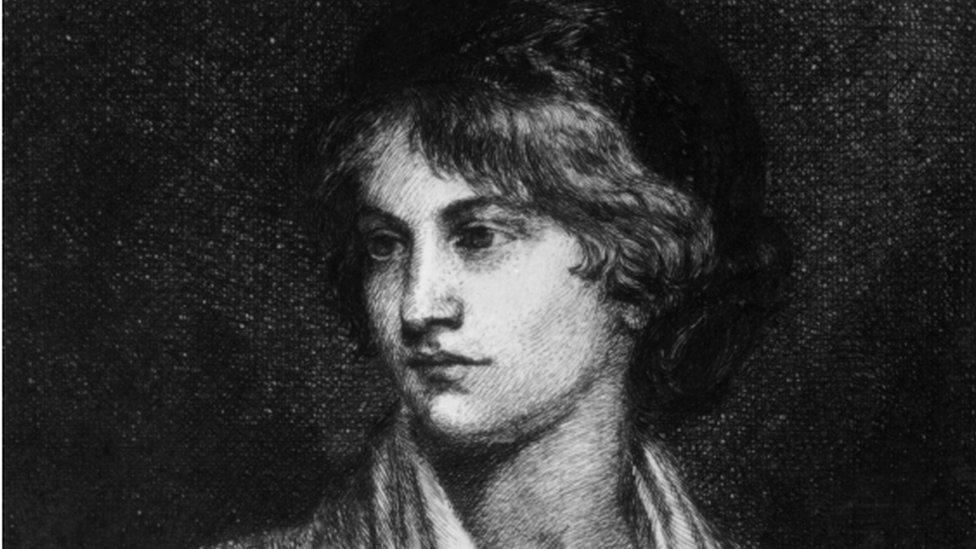Political heroes: Hague on Pitt the Younger
- Published
Lord Hague says his political hero is the "pilot who weathered the storm" after Britain lost its American colonies.
Given that he wrote a book on the subject in 2004 William Hague's choice of Pitt the Younger as his political hero is hardly surprising.
However, the fact it was a former prime minister who first introduced him to the name is a nice tale.
"I first heard of him from Margaret Thatcher can you believe, when I had my own fit of youthful endeavour in politics as a 16 year old, giving a speech at the Tory Party Conference in 1977," said the former Conservative leader.
"I was hauled off to meet Margaret Thatcher and she said to the assembled press: 'We could be standing here with another William Pitt' and I had no idea who that was, and I thought I'd better find out and as I did - over the next 20 years - I became quite an admirer.
William Pitt the Younger, so styled because his father 'Pitt the Elder' had also been prime minister, was a political prodigy.
He graduated from Cambridge at 17 and entered Parliament four years later in 1781. When he became prime minister he was still just 24 years old.
Lord Hague said: "He was written off at the time as a 'mince pie' prime minister, just in place for Christmas and then out, but he served for 19 years ... still our youngest and second-longest-serving prime minister".
Young Pitt was a reformer and counted the anti-slavery campaigner William Wilberforce amongst his closest friends. While others referred to him as a Tory, he always maintained he was an independent. William Hague is profuse in his praise.

Pitt the Younger served as PM between 1783 and 1801 and from 1804 to 1806
"He seemed to me to be an undervalued figure in history, that his name would come up in an episode of Black Adder, as a figure of fun ... Actually he was a towering figure, who stood alone against Napoleon, who plotted naval strategy with Nelson, he dealt with the most extraordinary range of circumstances" .
Pitt had become prime minister when Britain was still reeling from the loss of its American colonies. With the national debt spiralling upward "Honest Billy", as he was sometimes called in the press, set about steadying the ship.
Later in his career he would introduce both income tax and the first paper money, not backed by actual gold.
They were steps that didn't always make him popular, but as Lord Hague argues, they did produce results,
"This was much mocked at the time ... but his keeping the country creditworthy, the inexhaustible credit of the City of London and Britain ... allowed it to overcome Napoleon in the end, because France they said could almost never run out of men, but Britain would never run out of money".
'Stunted development'
Pitt's rivalry with the French emperor would come to define his premiership.
Despite his success, Pitt was famously aloof and even shy.
He never married and his devotion to his country consumed his life. His drinking contributed to his death at just 46 years old.

Margaret Thatcher was the first person to mention Pitt the Younger to a youthful William Hague

Many years later, the former Tory leader's admiration for him is undimmed
Former foreign secretary Lord Hague, who himself became party leader at the relatively young age of 36, feel some sympathy for him.
"Becoming so powerful so early in life, actually stunted his development as a human being in other ways because you don't make new friends or interests if you are at the heart of government ... I think all of us who are in those situations experience a bit of what William Pitt did ... but most of us leave at some point, he never did".
Lord Hague reserves his greatest admiration for Pitt the orator and parliamentarian,
"He really gave full vent to his personality in Parliament and this is an age where the House of Commons had in it: Charles James Fox, Richard Brinsley Sheridan, Edmund Burke, William Wilberforce, this is an age that makes today's Parliament look pedestrian in the extreme and he was the equal, if not the master, of them all."
William Pitt left office in 1801, but was prime minister again by 1804 and, despite warnings from his doctors that his work might kill him, he refused to leave his post and died as prime minister in 1806.
In the end he was, Lord Hague said: "The pilot who weathered the storm."
This interview is one of a series on politicians' political heroes, to be broadcast on the BBC's Daily Politics on Fridays.
- Published26 January 2018
